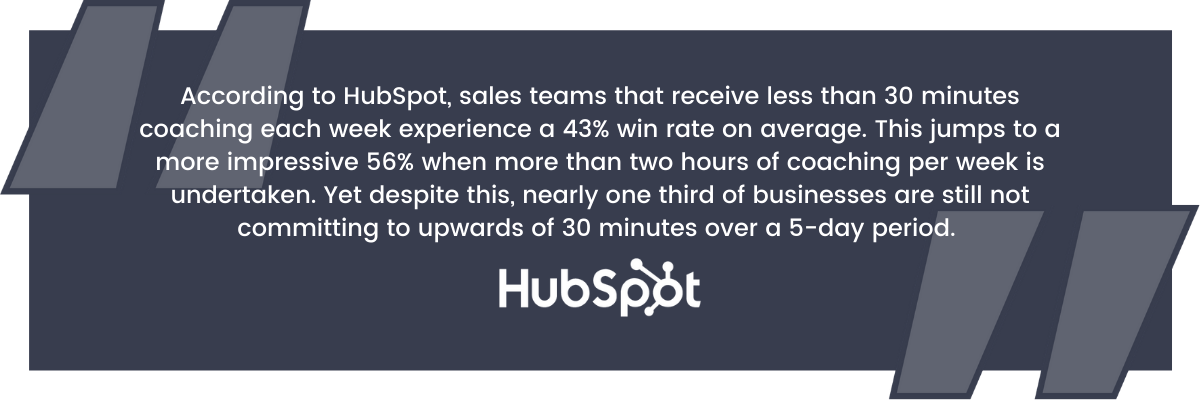
The Inbound Consultative Sales Coaching Guide for Sales Managers
‘Onboarding’ is one of the biggest buzzwords around. It’s a concept rooted in the idea of improved support for new hires as they become acclimated with the business in an effort to reduce the length of the typical transition period and help businesses to derive greater value from their new hires quicker than ever before. There’s no doubt that designing a great onboarding strategy is key for helping new hires to hit the ground running, but there is a dark side to onboarding: the risk of becoming complacent.
The Problem with Onboarding
One of main problems with onboarding is that business owners see so much value in it that they tend to think of hiring and investment in human resources as a onetime thing; as something that the onboarding process itself takes care of. But look at it this way: a new hire is like a new sports car, and the onboarding process is like reading the manual. But you wouldn’t stop there with a supercar; you’d consistently work to maintain it in order to experience optimal performance. And that’s where many sales managers are going wrong; they’re not ‘maintaining’ their team; they’re not constantly trying to improve the performance of that team. And that’s when things can become stagnant – something that is quickly reflected in the sales forecast.
The good news is that consultative sales coaching can help.
What is Consultative Sales Coaching?
The terms ‘coaching’ and ‘training’ are often interchangeable. However, they are different, and it’s important to understand the difference between the two in order to see the benefits of incorporating both into the inbound sales environment. At their core:
Sales training offers an opportunity for sales reps to learn new skills and develop new sales-specific talents, and to transfer these theoretical skills to a practical environment.
Sales coaching offers an opportunity for sales reps to continually improve on what they already know with ongoing support and progress monitoring from their sales manager.
Training is often organisation-based; it helps sales reps to build skills that the business needs them to have in order to deliver results. Coaching, on the other hand, is usually more personal. In fact, many coaching strategies are built around the GROW model:
Goal: The individual goals and missions of each member of the sales team
Reality: The reality of where a rep currently is in relation to their achieving their goal
Options: The different routes available for a rep to journey from A to B
Way Forward: How a rep wants to get from where they are to where they need to be

Why is Sales Coaching Important?
Perhaps sales managers wouldn’t have to focus on consultative coaching if the sales world remained stagnant. But it isn’t stagnant. The sales environment is always moving, and always shifting, which means that teams need to move and shift at the same time in order to ensure that the inbound sales process continues to align with the needs and expectations of buyers.
When there is a gap between what a sales rep is doing, and what they need to do to give buyers what they want, there is a risk that managers will jump in. This achieves nothing… other than wasting resources and overburdening managers.
Instead, sales reps should be given the skills, knowledge, and confidence needed to sell through change. The best way to achieve this is through consultative sales coaching.
How to Build an Effective Consultative Sales Coaching Programme

This is why it’s so important to build a consultative sales coaching programme. With a standardised strategy to improve performance, it becomes easier to incorporate coaching into the overall team culture, making it a normal, everyday occurance.
While each programme will be different, they should all be built around 4 pillars:

1. Gap Analysis
The first step to building an effective sales coaching programme is to take some time to properly define your sales process, and assess sales rep behaviours against this process. This can show you who’s performing well - and where - and makes it easy to identify gaps, weaknesses, and vulnerabilities; any areas where you may be able to step in and provide support. If you haven’t already, now is the time to invest in a good CRM system, like HubSpot, which can collect and track sales rep activities and data for easy analysis.
2. Resource Provision
Stop using ineffective coaching methods. Stop continually pointing out individual errors. Stop assigning blame. Stop telling, and start showing. Stop talking, and start listening. Rather than telling a member of your team that they’ve done something wrong, point them in the direction of a useful resource that can help them to understand what they could have done better. If you don’t have these resources, now is the time to develop them. Crafting a sales playbook, which contains useful documentation such as sales process content and a sales handoff template is a great way to build an in-depth knowledge library.
3. 1-2-1 Meetings
It’s important to take an individual approach to training, which means that team-wide meetings are best complemented with 1-2-1 sessions that provide an opportunity for sales manager and sales reps to openly discuss progress and identify new routes that could be explored in a bid to improve further and meet agreed goals. The GROW model discussed earlier should play a significant role in these meetings, and meetings should be scheduled regularly so that progress can be property monitored.
4. Involvement & participation
As a manager, it’s easy to think that coaching your team is your responsibility, and yours alone. But the truth is that this crucial task doesn’t just have to fall on your shoulders. In fact, getting everyone involved can bring even more advantages. The final pillar making up a great sales coaching programme is involvement. This means encouraging team members to coach, support, and guide each other when they have the opportunity to do so. Encourage reps to sit in on meetings, and listen to recordings of past conversions.
Is Consultative Coaching for Everyone?
Yes. And no. Ask yourself this… if you have a sales rep on your team who has been constantly underperforming, is it really possible to coach them to success? There are two answers to this question. The first is ‘absolutely’. Consider it from this perspective - if you’ve already identified that a sales rep is underperforming, then you’re in a prime position to do something about it. Acknowledging the problem is half the battle.
On the other hand, consultative coaching isn’t for everyone. Despite best efforts, and despite a well thought out consultative coaching programme, the truth is that sales reps can only be coached if they want to be. If they’re not interested in bettering themselves, in doing what they can to support others, or in producing results, then it’s important to question whether you’re just wasting your time. They say to always hire for attitude. After all, with the right attitude and the right mindset, you can train for skill.








%20-%20Teal.png?width=500&height=130&name=Force%20%26%20Friction%20-%20Branding%20-%20Logo%20(White)%20-%20Teal.png)